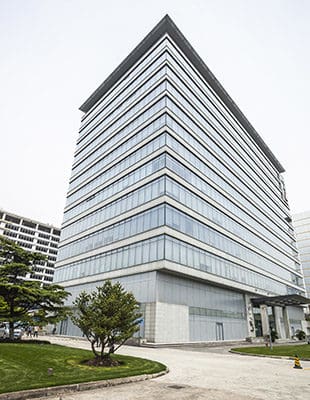
Evan Kleinberg is aiming for Asia-wide rollout of WeWork’s “participating lease” strategy
After two years of operating and expanding its Asian operation to 123 centres in nine countries, New York-based co-working provider WeWork believes its brand power and client demand has prepared it to begin partnering with landlords to supply the region’s office users “in a more strategic way.”
“The landlords and the developers are recognizing the strength of the WeWork model and the change of the workforce,” Evan Kleinberg, managing director and head of real estate at WeWork Asia, told Mingtiandi in an exclusive interview.
The nearly six-year veteran of the shared office giant says that WeWork is now looking to partner with landlords or developers at a “portfolio level” — working across multiple projects or buildings — and co-operating with building owners to open and manage office facilities, rather than renting sets of floors, which it then would sublease to end-users.
The strategic evolution not only marks a progression in scale from when WeWork opened its first, 3,200 square metre (34,444 square foot) Asian facility two-and-a-half years ago, but also shows the $42 billion startup’s growing leverage in working with developers.
Moving From Tenant to Partner With Developers
Key to WeWork’s new cooperation strategy are partnerships based on what the firm terms a “participating lease” — inviting landlords into a revenue-sharing arrangement, for creation of a new facility, rather than acting as independent service provider within a landlord’s building. The arrangement includes having the building owner inject capital for creation of a facility to be operated by a joint venture, or lowering upfront payments to be paid by WeWork, in return for receiving a share of the income that the shared space operator derives from the new location.

A WeWork location at a Sino-Ocean-owned building on Yan’an Dong Lu in Shanghai
Although the “participating lease” strategy is not a new initiative for WeWork globally, Kleinberg said the company believes the time is right to roll out the scheme in Asia. In its first partnership in Malaysia under the strategy, with Kuala Lumpur-based developer Daman Land, WeWork is setting up a new center at the Equatorial Plaza in the Malaysian capital in the first quarter of 2019.
In Indonesia, WeWork has participating lease agreements with Sinar Mas Land at its WeWork Revenue Tower and WeWork Sinarmas MSIG Tower locations in the heart of the Sudirman Central Business District.
“WeWork prioritizes its focus on delivering the best experience, while the developer can focus on their strengths to build the hardware,” Kleinberg said. “Together we can align our interests to grow in a smarter way.”
From Tenant/Landlord to Joint Venture
In seeking its revenue sharing partnerships with developers WeWork is marketing its ability to offer “a one-stop solution” that takes a “holistic” approach to providing commercial space from designing and building-out spaces that make comfortable corporate homes to managing facilities and creating engaging programming that helps build workplace communities.

WeWork opened a centre at Sino-Ocean’s Guanghua International Centre in Beijing early last year
In working with landlords the company says that its efficiency in design, project management and marketing to tenants can help building owners save money and time.
In China the co-working giant has already inked revenue-sharing agreements with global supply chain manager Fung Group, which owns the LiFung Plaza in Shanghai, and with Beijing-based developer Sino-Ocean Group.
In its partnership with Sino-Ocean, the shared space manager is providing its design expertise, digital tools and brand power to build a portfolio scale venture which also leverages the company’s global member network and management experience to squeeze more value from Sino-Ocean’s real estate assets, local market expertise and capital resources.
“Before we entered a participating lease with SOG, we already operated in three of their buildings,” said Kleinberg. “We then built on that trust and agreed on a framework that would allow WeWork to identify buildings across SOG’s portfolio.”
Upgrading in China
With Fung Group, WeWork leaned on its Powered by We program, a white-label service for office creation and management, to help the 112-year-old Hong Kong firm to upgrade its 30,000 square metre mainland headquarters in Shanghai’s suburban Minhang district.
Under Powered by We, the commercial building was redesigned and fitted out, with part of the facility now operated as a WeWork-branded centre. Now that the facility is complete, the WeWork continues to support LiFung Plaza with online systems for managing facility operations and provides WeWork team members to help implement community programs on site.
With part of the facility made available for lease to third-party occupiers, WeWork’s team also used its marketing resources to bring in new tenants, or member companies as WeWork calls them, with revenues from leasing the facility shared between WeWork and Fung Group.
The arrangement has allowed Fung Group to “maximise the use of our buildings that cater to the changing needs of tenants and utilize the space more effectively,” said Belinda Fung, chairman of Fung Properties China, the real estate arm of Hong Kong-listed Fung Group.
“The strategic partnership allows us to generate greater returns than a traditional leasing model,” she added.
Greater Risk, Greater Reward
While WeWork sees its cooperative leasing scheme as the wave of the future, Jonathan Wright, director of flexible workspace services for Asia at Colliers International, points out that revenue sharing between office operators and landlords is not a new concept. Flexible workspace providers, such as IWG — formerly Regus — have been using variations of this model for several years in a number of markets.

LiFung Plaza in Minhang gave WeWork a chance to bring some attitude to Shanghai’s suburbs
While the potential for revenue sharing to bring greater profits to shared office providers seems clear, Wright cautioned that, “A landlord should take each deal on a case-by-case basis,” before forgoing the sure thing of a fixed-rent lease.
The veteran broker agrees, however, that change is coming to the flexible workspace sector and expects to see co-working operators increasingly taking on a new role as service providers for developers and building owners. “With grade A assets, we expect much deeper collaboration with established operators to curate and deliver a wide range of uses of a space. The more a landlord can align the right operator, the more it makes sense,” he said.
Research by New York-based real estate consultancy HR & A Advisors showed that WeWork can help generate as much as 29 percent in rental premiums for building owners. In select buildings in New York that sold after WeWork moved in, there was a 50 percent to 120 percent increase in the sale price of the building. By making big buildings accessible to small companies, WeWork generated an additional $200 million in rent for landlords in New York City alone.
In December, WeWork launched its eighth location in Hong Kong, with more than 1,000 desks spread over 17 floors at LKF Tower in Central.
In 2019, the company, which is valued at $42 billion, plans to add Guangzhou, Wuhan, Xi’an, Nanjing and Suzhou to its 69 operating locations in Greater China.

What happens when the rent free periods and free beer runs out?
Ah, but under revenue sharing, could the rent-free period not last indefinitely?